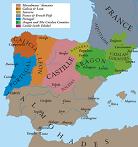
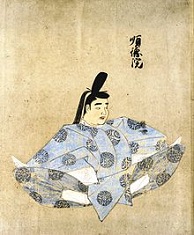
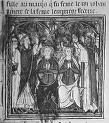

1210 On Sept. 13 French Crusader John of Brienne (1170-1237) reaches Acre, and on Sept. 14 he marries Marie de Montferrat (1192-1212) (queen of Jerusalem since 1205), and on Oct. 3 is crowned king of Cypress and Jerusalem in Tyre (until 1225). In Sept. rainstorms in Scotland cause flooding and destroy the harvest; the royal castle at Perth is swept away, and William I and his brother narrowly escape by boat; a revolt then begins in Moray, which William I quashes at the expense of his failing health. On Nov. 18 after HRE Otto IV invades Sicily (papal territory) to seize it from his boy Frederick II of Hohenstaufen, Pope Innocent III excommunicates him for it. On Dec. 12 retired emperor Go-Toba (b. 1180) pressures emperor (since Feb. 18, 1198) Tsuchimikado (b. 1196) into abdicating, and Go-Toba's 3rd son Juntoku (1197-1242) (personal name Morinari) becomes Japanese Yamato emperor #84 (until May 13, 1221), while Go-Toba wields the real power as a cloistered emperor. Loose brown lips sink ships? After once up-and-coming William de Braose, 3rd baron Abergavenny and his wife Maude de St. Valery shoot off their mouths and tattle that John I killed his nephew Arthur, John sends a force which invades Wales and lacklands their domains, claiming unpaid fees; he then goes on a second expedition to Ireland (first 1185) to capture his pesky son William de Braose, 4th Baron Abergavenny (1175-1210), husband of Mathilde (Maude) de Clare (1180-1213) (daughter of Richard de Clare, 3rd earl of Hertford), after which he starves them to death in Windsor and/or Corfe Castle; 20 Irish kings do homage to King John, and he expands his king's council in Ireland, forming the basis of the Irish parliament; too bad, John's cruelty backfires, scaring the other barons into fomenting a revolt, becoming his greatest mistake; he does let Little Brownose's sons John, Giles, Philip and Walter live, and they are released from prison in 1218 to carry on the Brownose, er, Braose name. The Council of Avignon excommunicates Raymond VI of Toulouse, and he goes to Rome to try and clear himself with Pope Innocent III; on his return he finds his dominions overrun by Simon IV de Monfort, baron of Ile de France, who becomes count of Toulouse. The Khwarezmians defeat the Qara-Khitai and conquer Transoxiana. John "Francesco" Bernardone (1182-1226) of Italy (St. Francis of Assisi) gets Rome's support for his group of teenaged "little brothers", founding the Franciscan Order - they peak sexually at age 17 anyway? Yaroslav II Vsevolodovich (1191-1246) is sent by his daddy Vsevolod III to fight new prince Mstislav Mstislavich the Bold of Novgorod, who raises his siege of Tozzhok, and after several battles they make peace in 1214 and Yaroslav secretly marries his daughter Rostislava Mstislava (maternal granddaughter of Kotian Khan); too bad, they divorce in 1216. The Council of Paris reacts to the shock of Latin translations of Aristotle's "Physics" and "Metaphysics" and the commentaries of learned Muslim infidel brain man Averroes by condemning Aristotle proponents Amalric of Bena (-1207) and David of Dinant (1160-1217) (who began attacking Christian doctrines incl. miracles, creation, and immortality, leading their followers to deny heaven, hell, and the sacraments), and forbidding the reading of Aristotle's "metaphysics and natural philosophy" along with any "comments" (commentaries); too bad, this only makes them more popular, and in 1215 a papal legate arrives in Paris to repeat the prohibition, which doesn't stop Aristotle from being required reading at the U. of Paris in 1255; 10 Amalricians are burned at the stake, and Amalric's bones are exhumed and burned in a Paris square; David of Dinant's book Quaternuli is condemned and burned. Beginning in this decade anti-Semitism markedly rises in France, with Jewish goods being seized and special taxes imposed (until 1289). In this decade tiles begin replacing thatched and wooden roofs on London houses. In this decade the village of Cosmeston in the Vale of Glamorgan in S Wales begins as a fortified manor built by the Norman invader De Constentin family. In 1210-50 (1230-70?) Old French trouvere Colin Muset from Lorraine flourishes in Champagne. Architecture Blarney Castle 5 mi. from Cork, Ireland is built on the site of a timber house by the MacCarthy clan of Muskerry, becoming the site of the famous Blarney Stone in 1446. Births: Portuguese king (1248-79) Afonso III (the Brave) (d. 1279) on May 5 in Coimbra; 2nd son of Afonso II (1186-1223) and Infanta Urraca of Castile; brother of Sancho II (1209-47). Scottish queen consort (1221-38) Joan (Joanna) (d. 1238) on Jully 22; 3rd child of King John and Isabella of Angouleme; wife (1221-) of Scottish king Alexander II. Swedish statesman Birger Jarl Magnusson (d. 1266). Italian surgeon-cleric William of Salicet (Guglielmo da Saliceto) (d. 1277) in Saliceto. Scottish king's mother Devorguilla of Galloway (d. 1290); wife (1223-) of John I de Balliol, 5th baron de Balliol (-1268); mother of John I (1249-1314). Persian poet Sadi (Saadi) (Abu Muhammad Muslih al-Din bin Abdallah Shirazi) (d. 1291) in Shiraz. Deaths: French poet Jean Bodel (b. 1167) early in the year in Arras (leprosy); leaves La Chanson des Saisnes (Song of the Saxons), about Charlemagne's war with the Saxons and their king Widukind (Guiteclin). German poet Hartmann von Aue (b. 1170); leaves Iwein (based on the Arthurian cycle), Gregorius (romance). German poet Gottfried von Strassburg (b. ?); leaves the unfinished epic Tristan (and Isolde), based on a vers. by French trouvere Thomas; Tristan (Tristram) (Lat. "sad") is a knight sent to Ireland by King Mark of Cornwall to bring back Princess Isolde to be his bride, but they fall in love and tragically die together; in some versions Isolde is a princess of Brittany; helps inspire Richard Wagner's 1865 opera "Tristan und Isolde".

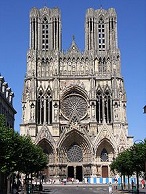
1211 In Jan. Gofraid (Guthred) mac Domnaill (MacWilliam) (-1213), son of Donald Mac William (d. 1187) begins a bloody revolt in Ross, N Scotland, causing bedridden William I to have to leave Kintore with his physician Master Martin and fight him for 3 mo., then return S and leave his troops to carry on without him, who luck out when Gofraid's supporters go fraidy cat and betray him to William Comyn, justiciar of Scotia (warden of Moray), who beheads him. On Mar. 27 Sancho I (b. 1154) dies, and his son Afonso II (the Fat) (Gordo) (1185-1223) becomes king #3 of Portugal (until Mar. 25, 1223), dropping the territorial enlargement war with Castile to insure peace, dealing with pesky brother Peter I and sisters Mafalda, Sancha, and Theresa, eventually exiling Peter I; going on to design Portugal's first written laws and send ambassadors to Euro kingdoms outside the Iberian Peninsula to establish commercial relations, attempting to weaken the power of the clergy by applying a portion of Church revenues to govt. use, ending up getting excommunicated by Pope Honorius III. On Mar. 31 the 1211 Synod of Rome announces the excommunication of HRE Otto IV; in Sept. the Diet of Nuremburg invites Frederick of Hohenstaufen (later HRE Frederick II) to be German king in Otto IV's place. In July Latin patriarch #1 of Constantinople(since 1204) Thomas Morosini (b. 1170) dies; his see remains vacant until Nov. 15. In Aug. after falling out with Llewelyn the Great and invading Gwynedd and being driven back, John I reinvades, crosses the Conwy River and invades Snowdonia, then burns Bangor and captures its bishop, causing Llywelyn to sign a peace, giving up all his lands E of the Conwy River along with his illegitimate son Gruffydd as a hostage (until 1215). On Oct. 15 the Battle of the Rhyndacus River is a V by the Latin Empire over the Nicaean Empire, allowing the Latins to push into Pergamum and Nymphaeum until being slowed by guerrilla warfare. Theodore I Lascaris is defeated by HRE Henry I at the Battle of Luparcos, and makes peace, abandoning part of Mysia and Bithynia to the emperor, who begins the invasion of Anatolia. Seljuk sultan Kaykhusraw I of Rum is KIA in single combat with Theodore I Laskaris of Nicaea, and his eldest son Kaykaus I (-1220) becomes sultan of Rum (until 1220); under his rule the sultanate peaks. Mongol attacks on the Manchurian Jin Dynasty begin, led by Genghis Khan, who gets the edge when the stupid Jin cmdr. sends messenger Ming-Tan to talk rather than attack first, and he defects and gives away their position at Badger Pass, allowing the Mongols to massacre thousands of Jin troops and win a big V. At the request of King Andras II of Hungary, Hermann von Salza leads his Teutonic Knights to the Burzenland in Transylvania to fight the Cumans, but after the Hungarian nobles complain, they leave by 1225. 300 Jewish rabbis leave persecution in England and France to settle in Jerusalem, where they are welcomed by Saladin's brother Sultan al-Adil. Riga mints its first coinage. The town of Kirkintilloch (Gael. "fort at the end of the hill") (AKA Kirkie or Kirky) on the old Antonine Wall in modern-day East Dunbartonshire, Scotland is granted burgh status, becoming an important staging post for W-E journeys from Glasgow to E and NE Scotland. Architecture: The Cathedral of Santiago de Compostela (begun 1060) is finished. On May 6 after the original 5th cent. church burned down last May 6, the new High Gothic Notre-Dame de Reims (Our Lady of Reims) Cathedral in Reims (Rheims), France is begun by architects Jean d'Orbais (1175-1231) (master architect), Jean-le-Loup (who replaces Jean d'Orbais in 1231-47 or 1235-51), Bernard de Soissons (1255-90 or 1259-94), and Gaucher de Reims (1247-55 or 1251-9), complete with 3-tier elevation and qudripartite vaults; it is finished in 1275, with the upper facade taking until 1311. Riga Cathedral (Riga Dom) is begun, becoming the largest medieval church in the Baltic states. Nonfiction: Ralph of Coggeshall, Suffolk, England, Chronicum Anglicanum; claims that some fishermen netted a naked, bearded, hairy-chested merman, who can't speak and likes to eat raw fish; also claims that two mysterious green-skinned children appeared in Woolpit, England wearing strange clothes and speaking an unknown language - Mel Gibson's ancestor? Klaas van Haarlem, William of Orange (1211-17). Births: Austrian-Styrian Babenberger duke (1230-46) Frederick (Friedrich) II (the Quarrelsome) (the Warlike) (d. 1246) on Apr. 25 in Wienr Neustadt; son of Leopold VI (1176-1230) and Theodora Angelina. Deaths: English fallen brownose William de Braose, 3rd Baron Abergavenny (b. 1153) on Aug. 2 in Corbil, Marne, France. Roman Byzantine emperor #159 (1195-1203) Alexius III Angelus (b. 1153). Portuguese king (1185-1211) Sancho I (b. 1154) on Mar. 27. Italian Latin patriarch of Constantinople #1 (1204-11) Thomas Morosini (b. 1170) in July.


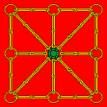
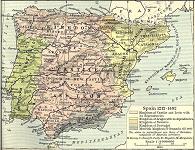
1212 Early in the year Llywelyn the Great allies with other Welsh princes and recovers his lands from King John er, Lackland, who summons his English feudal army for an Aug. campaign in Gwynedd, Wales, but dismisses it after he learns that his barons are plotting treason against him, and restores some of the lands of Gwenwynwyn ab Owan, which doesn't fool Llywelyn any, allying with Philip II of France (until 1216). In Feb. Scottish Queen Ermengarde meets with King John to renegotiate the 1209 Scottish-English treaty, and John agrees to arrange the marriage of his infant daughter Joan (Joanna) (1210-38) to her 14-y.-o. son Alexander II (b. 1198), causing the latter to travel S with King John to be knighted at Clerkenwell Priory in London (HQ of the Hospitallers) next year. On Apr. 12 Vladimir grand prince (since 1177) Vsevolod III the Big Nest (b. 1154) dies, and his 3rd son Yuri (Gyorgy) II Vsevolodovich (1189-1238) becomes grand prince #4 of Vladimir (until 1216), getting into a war with dispossessed #1 son (elder brother) Konstantin Vsevolodovich (1186-1218), who allies with Mstislav the Bold against him; meanwhile #4 son Yaroslav Vsevolodovich is bequeathed Pereslavl-Zalessky, and allies with Yuri II. In Apr. after leaving Ireland and arriving in Ross to raise a rebellion against aged unloved Scottish king William I, the latter leads a great army N but fails to win a decisive V, returning to England and leaving Maol (Mael) Choluim (Malcolm), Mormaer of Fife (1204-28) as his lt. in Moray, then facing another army led by Alexander I's son Alexander II followed with another army led by William I incl. Brabant mercenaries supplied by King John of England, Scottish rebel Gofraid Mac William (Domnaill) (b. ?) is betrayed to William Comyn, Justiciar of Sotia and Warden of Moray, captured and beheaded this year or next. In June the Children's Crusade in France (poor people not children?) is preached by big-mouthed boys Stephan (Stephen) of Cloyes (b. 1200) and Nicholas of Cologne (b. 1202); too bad, it fizzles when Stephan's crowd is sold into slavery or returns home after reaching Marseilles, while Nicholas' contingent allegedly reaches as far as Pisa and the Papal States before being turned back; the origin of the legend of the Pied Piper? In the summer King John oversees the hanging of 28 sons of Welsh princes and lords who were being held hostage for their fathers' good behavior, incl. one less than 7 years old. 1200 years of Christ's teachings and 600 years of Muhammad's teachings collide in Spain, and the total loser Christians turn their trash into cash with a big Muslim yard sale? On July 16 (Mon.) Alfonso VIII of Castile and Leon, leading a 50K-80K-man kiss-and-make-up Christian army (largest yet in Spain) which incl. the armies of rivals Sancho VII of Navarre, Peter II the Catholic of Aragon, and Afonso II of Portugal sneaks through the Despenaperros Pass and surprises, defeats, and systematically slaughters a 300K-400K-man Berber Almohad army from Spain and N Africa under caliph Muhammad al-Nasir at the turning point Battle of Las Navas de Tolosa, with 100K Muslim vs. 2K Christian casualties; the battle is won when 7-ft.-tall Sancho VII of Navarre leads his men through the wall of nearly naked chained African slave soldiers carrying hippo hide shields surrounding the tent of caliph al-Nasir, who dies shortly afterward (next year) in Marrakesh, and is succeeded as Almohad caliph #5 by his 16-y.-o. son Yusuf II (1197-1224) (until 1224); Muslim rule in Iberia begins to slide as 1M panicked Muslims flee back to N Africa, after which the Almohads become kaput in Spain by 1232, and all the Muslims have left in Iberia is a toehold in Granada in the S, which is a tributary of Castile; Sancho VII of Navarre adopts the Chains and Emerald Emblem; July 16 becomes the Spanish holiday called Triumph of the Holy Cross until the Second Vatican Council abolishes it; meanwhile, as Peter II is out slaughtering Muslims, Simon IV de Montfort, 5th Earl of Leicester (1160-1218), leader of the anti-Cathar Albigensian Crusade conquers Toulouse and exiles Count Raymond VI, causing him to call on the aid of his brother-in-law Peter II, who comes a-runnin'. In Nov. Pope Innocent III gives King John an ultimatum to submit by June 1, 1213 or be declared deposed, and he finally begins to crack? On Dec. 2 the Diet of Frankfut elects Frederick II of Hohenstaufen as German king Frederick II (1194-1250) (until Dec. 13, 1250), and deposes HRE Otto IV of Brunswick, who refuses to abdicate, causing pissed-off Pope Innocent III to conclude an alliance with Philip II Augustus of France to aid Frederick II against the "usurper", who allies with King John of England to make war on France; meanwhile Ottokar I of Bohemia receives the Golden Bull of Sicily, a decree by Frederick II on Sept. 26 in Basel proclaiming Bohemia a kingdom and Bohemian princes hereditary kings; of course, popes don't give you the world without buying your soul, so Frederick II has to promise his former guardian Innocent III to relinquish his possessions in Sicily and S Italy to calm the papal fear of a union of Italy and Germany, plus free the clergy from lay jurisdiction and taxation, and practice exemplary cruelties upon German heretics to earn brownie points; too bad, after his seat is warm, well-read freethinker Frederick II reneges, preferring balmy Sicily as a residence to freezing Germany, continually baffling his guardian Pope Innocent III until his death in 1216 - didn't he follow Dr. Spock? Venice conquers Crete. France enacts the death penalty for sodomy, becoming the first Euro criminal law against it since Visigoth Spain in 654, which didn't have a death penalty; in 1250 Norway and Castile enact the death penalty for homosexuals, followed by Bologna, Italy in 1259, Siena, Italy in 1262, England in 1275, France in 1283, and Florence, Italy in the 1340s - Norway or the highway? Queen Mary de Montferrat of Jerusalem (b. 1191) dies of puerperal fever from childbirth, and her hubby John of Brienne becomes regent for their infant daughter Yolande (Isbella) II de Brienne (1212-28). Bishop Albert of Riga forces the city of Polotsk on the Polota and Divina Rivers to grant German merchants free river passage, and they concede Kukenois (Koknese) and Jersika, also ending the pagan Livs' tribute to Polosk. St. Francis and his friend Claire found the Second Order of Franciscans (cloistered nuns). Births: Japanese Yamato emperor #86 (1221-32) Go-Horikawa (Yutahito) (d. 1234) on Mar. 22; 3rd son of prince Morisada, 2nd son of Takakura (1161-81). Welsh prince (1240-6) Dafydd ap Llywelyn (d. 1246) in Mar./Apr.; son of Llywelyn the Great (1173-1240). Italian holy domestic servant (St.) Zita (d. 1272) in Monsagrati (near Lucca), Tuscany; feast day: Apr. 27 (bake some bread?); patron saint of domestic servants, helps find lost keys. Portuguese king #5 (1248-79) Afonso (Alfonso) III (the Brave) (d. 1279); son of Afonso II (1186-1223); brother of Sancho II (1210-48). Deaths: German duke of Saxony (1180-1212) Count Bernhard of Anhalt (b. 1134) in Ballenstedt. Russian grand prince Vsevolod III the Big Nest (b. 1154) on Apr. 12. French knight-historian Geoffrey de Villehardouin (b. 1160). Jerusalem queen (1205-12) Maria of Montferrat (b. 1291) (puerperal fever).


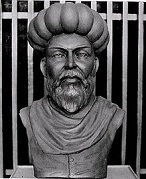
1213 Medieval soundbyte of the century by Pope Geraldo? Pope Innocent III declares that Muhammad has been positively identified as the Antichrist, and that the Second Coming of Christ will happen in 1284 because it is 666 years after the founding of Islam (618). On Jan. 18 Georgian queen (since Mar. 27, 1184) Tamar the Great (b. 1160) dies, having expanded her pan-Caucasian realm from the Greater Caucasus Crest in the N to Erzurum in the S, and from Zygii in the NW to Ganja in the SE, with Shirvan as a vassal, Trebizond as an ally, and the Zachariad regime in Armenia as an ally; her son (coregent since 1207) George (Giorgi) IV Lasha (1191-1223) succeeds as king of Georgia (until Jan. 18, 1213), going on to face the horrific Mongols and see the empire crumble while going for Sufism. On Jan. 27 Philip II of France arranges the marriage of Alix of Thouars (b. 1201) to his cousin Peter Mauclerc of Dreux (1190-1250), whose father Robert I of Dreux is Louis VII's younger brother, and who becomes duke-regent Peter I in Alix's name; too bad, she dies in childbirth in 1221 without ever gaining control; meanwhile Peter becomes a pawn of John I of England, who dangles the earldom of Richmond in his face, at a price, causing him to leave the English army alone next year as it moves through Brittany. On Apr. 21 after seeing him alienate his own subjects by his many excesses, incl. fathering illegitimate children, jailing Jews to milk them of money, insulting nobles, allowing prelates to die in jail, and enforcing unpopular forestry laws, Pope Innocent III issues a Bulla Aurea (Golden Bull) calling for an ecumenical council, and deposes King Kong, er, John, authorizing Philip II of France to execute the sentence, fomenting a revolt in John's ranks and causing him to end up without support by his subjects who hate his werewolf guts, esp. when they hear rumors of a French invasion. On May 30-31 the English fleet led by Earl Wllliam Longespee of Salisbury stops the planned invasion by accidentally encountering and destroying the French fleet off the coast of Flanders in the Flanders; the French now turn against the count of Flanders, who counters on July 27 by forming the Anti-Capetian Alliance of King John, Emperor Otto IV (John I's nephew), the count of Boulogne, and most of the nobles of Flanders, Belgium, and Lorraine, causing Philip II and the pope to back a rival candidate for the imperial crown; on July 20 John's excommunication is lifted; on July 30 Stephen Langton is allowed to enter England from exile in France and act as archbishop of Canterbury; on Aug. 25 at a council in Westminster, Langton announces a mutual security agreement for the preservation of English laws, and reads Henry I's charter of liberties to the barons, persuading John not to punish them for not paying their scutages (shield taxes) (monetary payments in lieu of military service). It finally happens: An army of real turn-the-other-cheekers get more than their cheeks slapped by the Catholic Reality TV Show of the time? On Sept. 12 after king (since Apr. 25, 1196) Peter II of Aragon (b. 1178) comes to the aid of his brother-in-law Count Raymond VI Count of Toulouse against Simon IV de Montfort, he is unhorsed, shouts "I'm the king", but is KIA anyway by enemy troops at the Battle of Muret, after which his 30K-40K Albigenses panic and are defeated by 1.8K Roman Catholic Crusaders, who split their army into three divs. in honor of the Trinity; the Provencal culture in S France is now systematically wrecked along with the Albigensian heresy in a long series of horrors by disgusting Simon IV de Montfort, and many troubadors flee S France to Aragon and Catalonia; Peter II's son James I (the Conqueror) (1208-76) becomes king of Aragon (until July 27, 1276), going on to expand Aragon into Valencia to the S, Languedoc to the N, and the Balearic Islands to the N, plus get hold of the county of Barcelona from Louis IX, establishing naval supremacy in the W Mediterranean, and making Catalan the official state language. On Oct. 2 King John signs a royal charter with papal legate Pandulf at St. Paul's Cathedral in London, pledging to return all confiscated Church property and submit his crown and his kingdom in England and Ireland to Pope Innocent III as a fief of the Holy See, and swear an oath of fealty, ruling as the pope's vassal and promising to accept the pope's buddy Stephen Chapter-and-Verse Langton as archbishop of Canterbury, and pay damages to the clergy, plus a tribute to the pope of 1K marks a year; after John surrenders his kingdom to the pope, he receives it back after five days as a papal fief subject to perpetual tribute and fealty; in 1216 the pope sends Guala (Gualo) Bicchieri (1150-1227) as his legate to England (until 1218) to work John's leash, creating an "inglorious league" (Shakespeare, King John, 5.1.65) that pisses-off the nobles and sticks in the English craw for cents.; "This England never did, nor never shall,/ Lie at the proud foot of a conqueror" (Sir Richard in King John, 5.7.112-3) - this is as good as it gets for papal power over European kings, but too bad he couldn't keep his former diaper stuffer Frederick II in line? The limestone Grotto of Adelsberg (Postojna) near Trieste is discovered. Births: French duke of Burgundy (1218-71) Hugh IV (d. 1272) on Mar. 9 in Villaines-en-Duesmois; son of Eudes III (1166-1218) and Alice of Vergy; husband of Yolande de Dreux (1212-48); father of Robert II (1248-1306). Arab physician superbrain (in Egypt) Ala al-din (Alaeddin) Abu al-Hassan Ali ibn Abi-Hazm al-Qarshi al-Dimashqi (AKA Ibn al-Nafis) (d. 1288) in Damascus, Syria; first to describe the pulmonary circulation of the blood 400 years before the backward European William Harvey (1628). Deaths: Georgian queen (1184-1213) Tamar the Great (b. 1160) on Jan. 18 in Agarani Castle near Tbilisi. Spanish king of Aragon (1196-1213) Peter II the Catholic (b. 1178) on Sept. 12 in Muret, France (KIA).

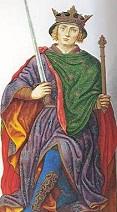
1214 Should I stay or should I go? You thought the title of Augustus was overrated? On June 29 the papal interdict against Merrye Olde Catholic England is lifted, and King John sails for Aquitaine, although many of his English barons refuse to follow him, holding a meeting in the abbey of St. Bury Edmunds in Suffolk NE of London and swearing to make him accept their Magna Charta of their liberties, causing him to hire mercenaries and tell them to stuff it, then landing in Poitou while HRE Otto IV of Brunswick and the count of Flanders prepare to invade from the N, and passing virtually undisturbed through the Loire Valley in Brittany; on July 27 Philip II Augustus of France and his son Prince Louis the Lion (1187-1226) (later Louis VIII), allied with the Hohenstaufens under papal-approved HRE Frederick II Hohenstaufen crushingly defeat the combined forces of John I, excommunicated-deposed HRE Otto IV of Brunswick, and the count of Flanders at the Battle of Bouvines in S Flanders near Tournai (10 mi. SE of Lille) in modern-day Belgium, with their prof. cavalry and bourgeois commune military besting old-style feudal infantry, although both sides suffer thousands of casualties; deprived of his German and other allies, John accepts a truce and returns to England in the fall, pretty much ruined; Flanders is now under French influence, and France is now in the top rank of Euro powers; Otto retires to his estates in Brunswick, and Frederick II becomes undisputed ruler of the Holy Roman Empire; there are no more major battles in W Europe until 1294, when France and England begin to chew each other up; meanwhile the long peace gives nobles time to decorate and furnish their drafty castles and chateaus, and take up court ritual and hunting. On Oct. 5 king (since Aug. 31, 1158) Alfonso VIII the Noble (b. 1155) dies, and his 10-y.-o. son (by Eleanor of England, daughter of Henry II of England and Eleanor of Aquitaine) Henry I (1204-17) becomes king of Castile and Toledo (until June 6, 1217), with his older sister Berengaria of Castile (wife of Alfonso IX of Leon) as regent. On Dec. 4 after making a summer trip to Moray to sign an accord with Earl John of Orkney, becoming sick on the return journey, and taking to bed when he reaches Stirling on Sept. 8, king (since Dec. 9, 1165) William I the Lion (b. 1143) dies, and on Dec. 4 his son (by Ermengarde de Beaumont) Alexander II (1198-1249) becomes king of Scotland (until July 6, 1249), and is crowned Canmore king of Scotland at Scone, attending his daddy's funeral on Dec. 9; his coronation before the funeral is a ploy to get the stubborn Scots to accept male primogeniture and keep his uncle (William I's brother) David, Earl of Huntington (1144-1219) (founder of the line leading to King John I Baliol and King Robert I) and the Mac William clan from having time to object that only an adult traditionally can become king in Scotland?; this doesn't stop Donald Ban Mac William (Meic Uilleim) (-1215) (descendant of Duncan II, who staged an uprising in 1181 and captured Ross) from starting a rising in Ross and Moray, which ends with his death next June 15 - another head in a box addressed to the king? In Dec. the 1214 Treaty of Nymphaeum (Nymphaion) is signed between the Latin Empire and the Nicaean Empire, halting the Latin advance into Asia Minor, confining Latin holds to NW Anatolia incl. the coasts of Bithynia and most of Mysia. Michael I Comnenus Ducas (b. 1170) dies, and next year his nephew Theodore Comnenus Ducas (Theodore Komnenos Doukas) (-1253) becomes despot of chuckalucka Epirus with whipped cream (until 1230), and announces his intention of expanding at the expense of the Latins and Bulgars by taking Durazzo and Corfu from the Venetians. Genghis Khan signs a peace treaty with the Manchurians, allowing him to capture Peking next year. Ottokar I of Bohemia begins a conflict with the Christian clergy over independence (until 1221). After Pope Innocent III, in an effort to reward the Crusaders issues the bull Quia Major, proclaiming the Fifth Crusade and ordering Jews to forgive all interest on loans made to them, Philip II of France balks, ordering Crusaders to settle up with "our men" (hominem nostris); Innocent III utters the soundbyte: "No Christian shall do the Jews any personal injury... or deprive them of their possessions... or extort money from them by threatening to exhume their dead"; Hugh of Lucca is appointed surgeon for Bologna, Italy for 600 Bolognini/year, with his contract requiring him to join the Fifth Crusader army in Egypt, where he discovers that wine cleanses and disinfects wounds, and that pus is unhealthy and not what other doctors call "praiseworthy pus" that cleans toxins from blood. Alaeddin Mohammed destroys the Qara-Khitai Empire (founded 1124) and the Gurid Sultanate of India. Frederick II invests the House of Wittelsbach (founded 1119) with the Palatinate, whose heraldic symbol is a cool lion (see 1240). The papal legate to England orders a chancellor chosen for Oxford U. to preside over a self-governing guild of masters; like the U. of Paris, Oxford U. is divided into "nations", the North for Scottish students and the South for Irish and Welsh students. Births: French Capetian king (1226-70) (St.) Louis IX (d. 1270) on Apr. 25 in Poissy (near Paris); son of Louis VIII (1187-1226) and Blanche of Castile (1188-1252); father of Philip III (1245-85); friend of Jean de Joinville (1224-1317); feast day: Aug. 24. English scholastic philosopher-scientist (Franciscan friar) Roger Bacon (d. 1294) (b. 1220?) in Ilchester, Somerset; early advocate of the methods of modern science; born into one forked-up superstitious mess of a Europe, he becomes the greatest scientist of his time? Deaths: Scottish king (1165-1214) William I the Lion (b. 1143) on Dec. 4 in Stirling; buried before the high altar of Arbroath Abbey. Spanish king of Castile and Toledo (1158-1214) Alfonso VIII (b. 1155) on Oct. 5 in Gutierre-Munoz.



1215 Don't slice off me balls, where do I sign? Nyaa, I renege? In Jan. English king John I is presented with the Articles of the Barons, demands by his northern barons (allied with Llywelyn the Great of Wales), who are pissed-off by the tyrant's long series of abuses in the admin. of justice, as well as his new attempts to tax them to pay a large ransom for his truce with France, demanding that he issue a charter modeled on Henry I's charter guaranteeing them their political and personal rights; he asks for a delay until Easter to answer while attempting to round up support against them, and on May 17 after assembling in Stamford and capturing Shrewbury without resistance, an army led by rebel baron Robert Fitzwalter (-1235) takes London, causing him to seek a truce on May 27; on June 15 the two parties meet in Runnymede Meadow on the Thames River 20 mi. SW of London in Surrey (Egham Parish) near Windsor (an open area where both armies can guard against ambush by facing each other across the field?), and under considerable duress (at swordpoint in a tent?) (a dagger under his balls under the table?) (his chamberlain Hubert de Burgh urges him to do it?) King John signs the Magna Carta (Charta) AKA the Great Charter, authored by Stephen Langton, who puts the first witness signature on it along with 25 barons and earls known as the Magna Charta Sureties, guaranteeing the freedom, rights, and liberties of the Church of England (Article 1), providing that only a gen. council of the kingdom can impose scrotum, er, scutage (Article 12), guaranteeing the freedom of the city of London and its merchants (Article 40), and granting to the aristocracy the right to habeas corpus (Article 36), and the right to lawful judgment of their peers (not necessarily trial by jury) (Article 39), and protection against arbitrary acts of the king incl. taxes by a House of Lords (archbishops, bishops, abbots, earls, and "greater barons of the realm") (the precursor to "no taxation without representation") (Article 14); widows can't be forced to remarry; standard measures will be used for wine, ale, cloth, and corn; towns can't be forced to build bridges; royal officials can't steal wood, horses, or carts; no murder arrest can be made if a woman brings charges unless the victim is her husband; Article 39 provides for due process of law; Article 60 says that "All the aforesaid customs and liberties... all people of our kingdom, as well clergy as laity, shall observe, as far as they are concerned, towards their dependents"; King John acknowledges that Welsh Wales is still under Welsh law; recalcitrant barons break the charter's terms even before it is signed, harrying the king's lands and men, and within 2 mo. John sends abroad for mercenaries to fight them, while kibbitzing Pope Innocent III, who gets pissed-off by lack of recognition of his powers and issues a bull on Apr. 21 backing John, which doesn't stop the barons, who renounce their feudal ties to John in May and March on London, Lincoln, and Exeter, spurring a wave of royalist defectors, starting the First Barons' War (1215-17), leading King John to appeal to the pope to excommunicate the rebel barons, which he does, along with the citizens of London and the Cinque Ports; after Stephen Langton refuses to pub. the ban he is suspended by the papal legates, who help King John raise money for mercenaries from Flanders and France, while the rebel barons, lacking public support outside London invite Prince Louis the Lion, son of Philip II Augustus to invade England and become their king (big mistake?); the papal legates forbid Prince Louis and his followers from crossing the Channel, and excommunicate them when they try it, along with 17-y.-o. Alexander II of Scotland, who in Oct. leads an army over the Tweed River and takes the homage of the barons of Northumbria, something his daddy William I Lion couldn't do in 50 years; King John appoints his chamberlain Hubert de Burgh (1165-1243) as chief justiciar of England (until 1232), going on to personally lead the fight against the invading French army; in Nov. King John seizes the castle of ringleader Richard de Clare, 3rd Earl of Hertford (1153-1217) in Tonbridge and grants his lands to Robert de Bohun; meanwhile the Scots take Carlisle; Rochester Castle is captured by the baronial forces from Stephen Langton, causing the king to siege it for seven weeks until the garrison surrenders from hunger, after which the French recapture it; Millennium Feverists see it all as a sign that the Kingdom of Christ on Earth is drawing nigh?; the Melrose Chronicle is written by Scottish borders monks, becoming the first independent account of the Magna Charta, containing the soundbyte: "A new state of things begun in England; such a strange affair as had never been heard; for the body wishes to rule the head, and the people desired to be masters over the king"; in 1984 U.S. millionaire H. Ross Perot buys one of the 17 surviving copies of the Magna Charta for $1.5M - does that make him English nobility? Start the music, the Catholic Unmagna Charta, or, Oh Hell, you can't stop us now? Perfect opportunity to kick the Eastern Church when it's down? On Nov. 1-30 the first three Lateran Councils (1123, 1139, 1179) are topped by the Fourth Lateran (12th Ecumenical) (Great) Council, called by Pope Innocent III and attended by two Eastern patriarchs incl. Raoul of Merencourt (-1225), Latin patriarch of Jerusalem (1214-25) (who gives a killer speech on day 1 calling for a new Crusade), new Latin patriarch #2 of Constantinople Gervasius (Gervais) of Heraclea Pontica, plus reps. of many secular princes, 412 bishops, and 800 abbots and priors; it approves 70+ decrees, incl. a condemnation of the Cathari, Waldenses, Albigenses, and other heresies (true Christians?), along with a call to all bishops and princes to be especially vigilant against all heresy (now a combo civil-religious crime), esp. blasphemy of their precious Jesus Christ (the beginning of the horrible Inquisition?), the first confession of faith containing a definition of the new don't-say-cannibal doctrine of Transubstantiation (the turning of the bread and wine of the Lord's Supper into Christ's actual body and blood after a prayer by the priest), a requirement for all church members of the age of discretion to confess their sins to a priest and take Communion at least once a year ("Omnis utriusque sexus") (so they can be checked for heresy?), a decree forbidding priests to take part in ordeals, the command that damned Jews and Muslims in Christian Europe must wear items of clothing distinguishing themselves from saved Christians (color-coding for infidels, usually a 3-in. yellow cloth circle) probably taken from the Muslim World, which did it to Christians and Jews), and are prohibited from holding public office or going out during Holy Week (for their protection, of course), and a decree forbidding new monastic orders (new women have to join the existing ones); common-law-marriage is outlawed, and all marriages must be announced in a church by a priest; the Roman Catholic Church is declared the only true faith, outside which nobody can be saved, although the council recognizes the patriarchs of Constantinople, Alexandria, Antioch, and Jerusalem after the numero uno pope, in that order; Jews are doomed to perpetual servitude for crucifying Jesus; the council bans the teaching of the works of Aristotle except those on logic and ethics; all that remains is to prohibit Bible reading by laymen, which is done in 1229 - it took them over a thousand years to finally make up their minds about all this, and they leave a back door for the Greek Orthodox Church in hopes of reconciling? On Nov. 30 (last day) Pope Innocent III issues a Call for the Fifth Crusade at the Fourth Lateran Council, with Egypt as the objective and the date to be 1217; meanwhile he imposes another income tax on his clergy to pay for it, and prohibits trade with the Muslims to ensure a supply of ships; meaning to control it personally this time so it won't end up a bummer like the Fourth Crusade, he orders the Crusaders to meet with him in Brindisi next year, where he plans on offering each of them an indulgence for fighting or even helping with expenses; Frederick II vows to go on Crusade, and abdicate the kingdom of Sicily when he gains full recognition of the German princes, and is crowned as Hohenstaufen German king #6 Frederick II (1194-1250) in Aix-la-Chapelle, and the Hohenstaufen family rules Germany again until 1254. In Dec. after Welsh prince Rhys Gryg (the Hoarse) ap Rhys Fychan (the Younger) (-1234), held in captivity since 1213 is released by the English in hopes that he will start a civil war, but instead joins with Llewelyn the Great, the Welsh take advantage of English troubles and capture many castles in South Wales. Simon de Monfort sieges Toulouse and Narbonne; Raymond VI retires to England, goes to Rome to plead with Pope Innocent III again, then goes to Aragon after being refused. A party of Ghibellines from Genoa begin construction of a fortress on top of the Rock of Monaco, inviting fellow Genoese to settle by offering land grants and tax exemptions; later war in Genoa between the Ghibellines and Guelphs cause many of the later to seek refuge in Monaco, after which in Jan. 1297 Francois Grimaldi (-1309) (nicknamed "Malizia" = The Cunning) disguises himself as a Franciscan far and captures the fortress along with his cousin and stepson Rainier I (1267-134), who succeeds him. The Scottish clans of Meic Uilleim (MacWilliam) and MacHeths revolt against new king Alexander II, and are quickly put down. Genghis Khan and 75K men successfully siege the Chinese capital of Chungtu (modern-day Beijing), defended by 600K, finally getting even for cents. of oppression. The Khwarazmians finish conquering the Afghan possessions of the Ghurids, forcing them to withdraw to their remaining lands in N India. Yaroslav Vsevolodovich accepts an offer to become prince of Novgorod, but decides to put revenge first and captures Torzhok in order to block grain supplies, causing Mstislav the Bold to defeat him at the Battle of the Lipitsa River; Yaroslav loses a helmet in the battle, which is recovered by archaeologists in 1808. The Roman Catholic Church decrees that marriage partners have to publicly post banns in a local parish; it eliminates the reqt. in 1988. Births: Crusader count of Jaffa and Ascalon John of Ibelin (Jaffa) (d. 1266); son of Philip of Ibelin and Alice of Monteliard; nephew of John of Ibelin, Old Lord of Beirut (1179-1236). Mongol emperor (1260-94) Kublai (Kubilai) (Khubilai) (Hubilai) Khan (Shizu of Yuan) (d. 1294) on Sept. 23; 4th son of Tolui and 2nd son with Sorghaghtani Beki; grandson of Genghis Khan; founder of the Yuan Dynasty (1271-1368); keeps a kennel with 5K mastiff dogs. Italian pope (1294) Celestine V (Pietro Angelerio or Angelieri) (Pietro da Morrone) (d. 1296) near Isernia. Deaths: English troubadour Bertrand de Born (b. 1140) in Dalon. German poet Hartmann von der Aue (b. 1163). Italian Benedictine Cardinal-Bishop of Sabina (1204-) Giovanni di San Paolo (b. ?); nephew of Celestine II; of the Bobone not the Colonna family; friend of St. Francis of Assisi, helping obtain papal approval of the Franciscan Rule.
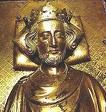



1216 In Jan. the northern rebels in England turn to Alexander II of Scotland for aid, and he receives their homage and fealty, pissing off King John, who swears to "make the fox cub enter his lair" (referring to Alexander's youth and red hair), and invades and sacks SE Scotland, causing Alexander II to launch a counterraid into Cumberland; meanwhile Llywelyn the Great holds a council in Aberdyfi to receive homage of the other Welsh princes, causing Gwenwynwyn ab Owain of Powys to reverse his allegiance again back to John I, after which Llywelyn drives him out of Wales into England, where he dies, and is succeeded by his young son Gruffydd ap Gwenwynwyn (-1286), who has been brought up in England at John I's expense, and becomes an English puppet against Llywelyn. On Apr. 22 the Battle of Lipitsa sees Konstantin Vsevolodovich allied with Mstislav the Bold defeat Yuri II and take the throne of Vladimir (until 1218); meanwhile the infighting in Russia softens it up for the coming Mongol invasion? In May French dauphin Prince Louis the Lion (later Louis VIII), son of Philip II Augustus invades England, landing in Kent, and being greeted by the barons and proclaimed king in London, capturing Winchester on June 14, causing King John's position in N England to collapse, giving it to Louis, and allowing Alexander II to recapture Carlisle on Aug. 8, then turn it into his seat of Scottish admin. over Cumberland and Westmorland. On June 11 Henry I of Flanders, Latin emperor of Constantinople (since 1205) dies in Thessaloniki (poisoned), and is succeeded by his brother-in-law (through his sister Yolande) Peter II of Courtenay (1155-1219), who is consecrated in Rome by Pope Honorius III next Apr. 9, and is captured en route to Constantinople by Theodore Comnenus Ducas of Epirus, dying in prison in 1219; his wife Yolanda of Flanders (Hainaut) (1175-1219) reaches Constantinople and rules as regent (until Aug. 1219), making peace with Theodore I Lascaris of Nicaea, who marries her daughter Marie (Maria) de Courtenay (1204-28). On June 16 Pope (since 1198) Innocent III (b. 1160) dies without having crowned his former ward Frederick II as HRE, and on July 18 Pope (#176) Honorius III (-1227) (yet another Roman) is elected, taking charge of the Crusade; meanwhile Stephen Langton travels to Rome to argue for the Magna Charta. In Aug. while Alexander II of Scotland meets with Fresh Prince Louis in Dover, becoming the farthest S any Scottish king has ever penetrated, King John moves to attack Alexander's rear, causing him to hurry back to Scotland; on Oct. 12 (Thurs.) bad king (since May 27, 1199) John Lackland (b. 1167) loses his royal baggage and treasure incl. his crown jewels (the scutage tax that caused the revolt) in the fens of the Wash in Norfolk in Lincolnshire, perhaps driving him mad (have you ever lost your baggage in the Fens of Norfuck?); on Oct. 18/19 (Wed./Thurs.) he dies of dysentery at Newark Castle in Swineshead in Nottinghamshire (Lincolnshire?) after eating at an abbey (according to William Shakespeare, he was poisoned by a monk named Brother Simon with a Death Cap (Amanita Phalloides) Mushroom, who tastes some of it first to prove it isn't poisoned, and dies with him) (a plot by the pope?) (or was it someone he ate?), and the English rapidly reunite around his 9-y.-o. son Henry III (1207-72), who is declared too young to have any responsibility for his father's crimes, and is crowned on Oct. 28 by a papal legate in Gloucester (the 28th English monarch) (until Nov. 16, 1272) (first crowned during his minority); he is controlled by regent William Marshal, 1st Earl of Pembroke (1146-1219) (top jousting champ, who lives in Pembroke, Wales, where he gets plenty of practice?), who designates the pope as his guardian; Peter des Roches (-1238), bishop of Winchester becomes his tutor; he grows into an artist-king who rebuilds Westminster Abbey; the rebel barons are ordered by Pope Honorius III to return to their natural allegiance under the threat of excommunication; the spat over the Magna Charta is dropped until Henry III grows up after William Marshal reissues it minus a few clauses (esp. the ones authorizing the barons to use force against the king, and those backing Alexander's grievances), and extends amnesty; later monks hear sounds from King John's grave, causing them to dig up his body as a suspected werewolf and move it from consecrated ground?; "Thus the ill presage of his surname Lackland was completely realized, for he lost in his lifetime almost all the domains under his suzerainty, and even after his death he could not keep peaceful possession of his tomb" (Norman Chronicle); Gilbert de Clare, 4th Earl of Hertford, 5th Earl of Gloucester, 7th Lord of Clare, 1st Lord of Glamorgan (1180-1230), son of rebel baron Richard de Clare, 3rd Earl of Hertford (1153-1217) is captured in Lincoln by William Marshall, and in 1217 after kissing and making up marries his daughter (by his wife Isabel Fitzgilbert de Clare, daughter of Richard "Strongbow" de Clare - you figure it out?) Isabel Marshall (1206-40), later becoming close friends with Henry III even though their daddies were enemies, and getting a new title of earl of Gloucester; meanwhile John I's sister Eleanor Plantagenet "the Fair Maid of Brittany" (1184-1241), who was captured along with her younger brother Arthur I at the Battle of Mirabeau and imprisoned with him is passed over like a bag of manure, and kept imprisoned in Corfe Castle in Dorset for life; King John's wife (since 1200) Isabella of Angouleme returns to France and marries her old beau Hugh X of Lusignan, count of La Marche; under Henry III Norman power in the British Isles rapidly expands, and the Irish are screwed bigtime, with native Irish turned into serfs who cannot make a will or sue an English defendant, and whose murder is not considered a felony by the courts, while Irish are denied access to higher ecclesiastical offices; meanwhile on Nov. 12 Henry III of England issues the Great Charter of Ireland, a version of the English Magna Charta securing rights for Anglo-Norman magnates in Ireland. Dominica nica nica? The Age of Friars begins after the disappointment of no Armageddon in 1216? On Nov. 29 Pope Honorius III approves the Rule of St. Francis, followed on Dec. 22 by the Rule of St. Dominic; the former place their chief stress on holy living and experience and poverty, eschewing learning (friars minors), the latter on evangelizing the world with well-read intellectual shock troops (friars preachers); while the Franciscans could be confused with Waldensian heretics, the difference is their complete acceptance of the Roman Catholic hierarchy and rejection of Donatism, accepting sacraments even from a bad priest, making the pope a fan; Franciscans become a hit with the bourgeoisie with their Horatio Alger message that personal religious devotion and purity rather than socioeconomic status bring salvation; Spanish priest (St.) Dominic (1170-1221) cuts his teeth preaching against the Albigensians in Languedoc, and his order follows rules derived from the Austin canons and the Premonstratensians, promoting candidates on intellectual ability rather than seniority, culminating in Thomas Aquinas; later both orders own property, become priests, and administer sacraments, pissing off the rest of the clergy, and both orders become scholars, with Franciscans dominating Oxford U. and Dominicans dominating the U. of Paris; eventually both orders degenerate into an indistinguishable mass of powerful, rich, obese, drunken monks professing phony poverty and hiding their vices under their robes? On Dec. 22 Pope Honorius III issues the bull Religiosam vitam, approving the Dominican Order (of Preachers). Science: Seville, Spain-born Andalusian Muslim scientist Abu'l Abbas al-Nabati (1166-1239) pub. Botanical Journey, a work on botany covering plants from the Atlantic to the Red Sea, earning him the name al-Nabati (the Botanist). Births: Danish king (1241-50) Eric IV Plovpenning (Plough-Penny) (d. 1250); son of Valdemar II (1170-1241) and Berengaria of Portugal (daughter of Sancho I); brother of Abel of Denmark (1218-52) and Christopher I (1219-59). English patriarch Sir William Howard (Haward) (d. 1308); justice of common pleas (1297-1308); founder of the pesky Howard Family, which refuses to give up its Roman Catholicism after England goes Protestant; his descendant Sir Robert Howard marries the daughter of Thomas Mowbray, duke of Norfolk, giving their descendants starting with John Howard (1430-85) the dukedom and beginning their rise. Deaths: Italian pope (1198-1216) Innocent III (b. 1160) on July 16 in Perugia, allegedly leaving the bull Quaedam Moralitas de Scaccario (The Innocent Morality), which claims that chess bishops (aufins) "are prelates wearing horns", and that "they move and take obliquely because nearly every bishop misuses his office through cupidity"; he also established the first foundling wheel in Rome, where mothers of newborns that don't want to raise them can deposit them for care by the Church in a kind of bank night depository drawer, which survives to modern times. English king (1199-1216) John I (b. 1167) on Oct. 18/19 in Newark Castle, Newark-on-Trent, Nottinghamshire (dysentery) (poison?); buried in Worcester Cathedral; he once outlawed Eustace the Monk but never heard of any Robin Hood? Latin emperor of Constantinople #2 (1205-16) Henry of Flanders (b. 1176) on June 11 in Thessaloniki (poisoned by Oberto di Biandrate, ex-regent of Thessaloniki at the instigation of his wife Maria of Bulgaria?)






1217 Peter II of Courtenay is captured by Theodore Dukas Angelus, despot of Epirus, and his wife Yolande becomes regent (until 1219), while her daddy John of Brienne (1170-1237) becomes Latin king of Jerusalem (until 1225); meanwhile in the spring after Pope Honorius III bars pesky Frederick II from participating, the Fifth Crusade begins (ends 1221); the Crusaders, led by Leopold VI of Austria and Andrew II of Hungary leave for Acre, where they are joined by John of Brienne, Hugh I of Cyprus, and Prince Bohemund IV of Antioch in an attack against the Ayyubids in Syria; Jerusalem Patriarch Raoul of Merencourt goes along, carrying a relic of the True Cross to pump them up; too bad, a screwup in funding causes a motley crew of cripples, aged, infirm, thieves et al. to join the army and be transported to the Holy Land, where they prove useless (except to prove to Muslims that Christians stink?); too bad, after they reach Jerusalem they find the walls and fortifications torn down and the Muslim defenders gone, and the Euros end up returning home next year; meanwhile, while no field battles are fought, both sides fight battles near their opponent's camps with the object of capturing or destroying their facilities; Andrew II overspends, causing him to sell royal land to oligarchs; the Latin Province of Syria is established, with Franciscian brother Elias as minister; by 1229 the Franciscans have a small house in Jerusalem near the 5th station of the Via Dolorosa. On Apr. 23 king (since 1204) Inge II Bardson (b. 1185) dies, and in June Haakon IV Haakonsson (the Old) (1204-63), the illegitimate son of Haakon III becomes king of Norway (until Dec. 16, 1263), which reaches its zenith as the civil wars rocking Norway since 1130 finally end; the first treaty of commerce with Norway is concluded with England. On May 20 Prince Louis the Lion (future Louis VIII) is defeated at the Second Battle of Lincoln (first in 1141) by a relief force under William Marshal; the Comte de la Perche is KIA, and Robert Fitzwalter is captured, after which the French sack the city of Lincoln, causing it to be called "Lincoln Fair"; meanwhile as much as the English hated John, now that he's gone they begin to react against Louis (because, according to Shakespeare in King John, 5.4.15-16, "Lewis means to recompense the pains you take/ By cutting off your heads"?). On June 6 king (since Oct. 5, 1214) Henry I (b. 1204) is killed by a tile falling from a roof, and his sister Berengaria (the Great) of Castile (1179-1246) becomes queen of Castile and Toledo, renouncing the throne on Aug. 31 in favor of her son (by Alfonso IX of Leon) Ferdinand III (the Saint) (1199-1252) (until May 30, 1252), who becomes one of Castile's top kings, expanding the dominions of Castile in al-Andalus incl. Cordoba and Seville, and securing the permanent union of the crowns of Castile and Leon after becoming king of Leon and Balicia on Sept. 24, 1230. On Aug. 24 the naval Battle of Sandwich is V for the English navy under Hubert de Burgh over the French navy under Eustace the Monk, who is KIA. On Sept. 11 after most of the rebel baron turn on Prince Louis the Lion, the Treaty of Lambeth (Kingston) is signed, and Louis agrees that he has never been the legitimate king of England; the French leave England and free Fitzwalter, ending the First Barons' Revolt (begun 1215); Henry III is acknowledged undisputed king of England, but the pope really rules it through his legate Guala (Gualo); the Charter of the Forest is agreed to by Henry III as a supplement to the Magna Charta, providing for the right of common access to royal forests for fuel, and abolishing the death penalty and mutilation as punishments for taking royal game, going on to become the longest-lasting statute in England until superseded on July 1, 1971 by the Wild Creatures and Forest Laws Act. On Sept. 12 Raymond IV retakes Toulouse while Simon IV de Montfort is away, causing the latter to return and in Oct. begin the Siege of Toulouse (ends June 25, 1218). In mid-Dec. Alexander II of Scotland travels to Northampton and gives homage to Henry III for his English lands, giving up his gains and going back to trying to win Northumbria by negotiation. Serbian grand prince (since 1196) Stephen II Nemanjic is crowned king of Serbia (Raska) by a legate of Pope Honorius III, causing him to be called Stephen Provencani (the First-Crowned) (until 1228). (St.) Ferdinand III (1199-1252) becomes king of Castile (until 1252), going on to fight the Moors in S Spain and reconquer all of Andalusia except Granada while pleasing the Roman Catholic Church by turning mosques into cathedrals dedicated to the Blessed Virgin and living a monastic lifestyle complete with itchy-scratchy hairshirt. The govt. of England issues an order prohibiting Irishmen from holding episcopal offices or serving as cathedral deans, and creating John St. John (-1302) as the first lord high treasurer of Ireland (high treasurer until 1695) (ends 1817). John (Ivan) Asen II (-1241), son of John Asen begins a revolt in N Bulgaria with aid from Galicia, and takes Tirnovo after a siege. Salamanca U. is founded in Spain by Alfonso IX of Leon to keep students from having to travel to Castile to study. Middelburg in the Netherlands is granted city rights, becoming an important trading center between England and Flanders. Births: French king of Cyprus (1218-53) Henry I (the Fat) (le Gros) of Lusignan (d. 1253) on May 3; son of Hugh I of Cyprus (1194-1218) and Alice of Champagne (1193-1246). Mongol Baghdad-burning Persian Ilkhanid khan #1 Hulagu (Hulegu) (d. 1265); son of Tolui and Sorghaghtani Beki (a Christian); brother of Arik Boke (-1266), Mongke (1208-59), and Kublai Khan (1214-94); grandson of Genghis Khan. French duke of Brittany (1221-86) John (Yann) (Jean) I (the Red) (le Roux) (d. 1286); son of Peter I (1190-1252) and Alix of Thouars; husband of Blanche of Navarre. German Hapsburg king and HRE #1 (1273-91) Rudolph (Rudolf) I (d. 1291) in Limburg an der Lahn; son of Count Albert IV of Hapsburg and Hedwig (daughter of Count Ulrich of Kyburg); starts with estates in Alsace and Aargau in 1239, then in 1245 marries Gertrude, daughter of Count Burkhard III of Hohenburg, becoming a big vassal in Swabia. Births: Malian emperor #1 (Muslim) Sunjata (Sundjata) (Sundiata) Keita (Maria Djata I) (Sogolon Djata) (d. 1255); founder of the Mali Empire; father of Mansa Wali Keita, Outai Keita, and Khalifa Keita; granduncle of Mansa Musa; basis of Disney's "The Lion King". Latin emperor of Constantinople (1228-61) (last) Baldwin II of Courtenay (Constantinople) (d. 1273); son of Peter I of Courtenay (1155-1218) and Yolande; brother of Robert I of Courtenay (-1228). Flemish scholastic philosopher ("the Solemn Doctor") Henry of Ghent (Henricus de Gandavo) (d. 1293) in Mude (near Ghent); claims that the human authors of the Bible are true authors, not merely organs or channels for God. Death: English scholar Alexander Neckam (b. 1157) in Kempsey: "Science is acquired at great expense, by frequent vigils, by great expenditure of time, by sedulous diligence of labor, by vehement application of mind." French pantheistic philosopher David of Dinant (b. 1160). English Norman knight Richard de Clare, 3rd earl of Hertford (b. 1162) on Dec. 30 in Tonbridge Castle, Kent. Norwegian king (1204-17) Inge II (b. 1185) on Apr. 23 in Nidaros.

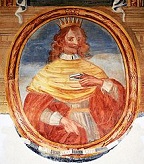
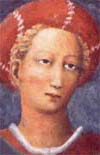
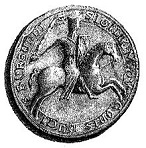

1218 On Jan 10, 1218 king (since Apr. 1, 1205) Hugh (Hugues) I de Lusignan (b. 1194) dies, and his infant son Henry I (the Fat) (le Gros) of Lusignan becomes king of Cyprus, with his mother Alice of Champagne (1193-1246) (eldest daughter of Count Henry II of Champagne and Isabella I of Jerusalem) as regent (until 1223). On Feb. 2 Konstantin Vsevolodovich (b. 1186) dies, and his younger brother Yuri II returns as grand prince of Vladimir (until 1238), going on to install his loyal younger brother Yaroslav (b. 1191) as prince of Novgorod and fight the pesky Volga Bulgarians; Yaroslav tries to keep up with his daddy Vsevolod III the Big Nest by marrying 3rd wife Fedosia Igorevich of Ryazan and having 12 children to feather his big nest, incl. Alexander Nevsky (b. 1220). On May 19 HRE Otto IV (b. 1175) dies, freeing his rival and pope's pet Frederick II to sail for the Holy Land to fulfill his 1215 vow to the pope; however, he keeps reneging, and never tucks in his booties and leaves, although his councilor Herman von Salza (grandmaster of the Teutonic Knights) goes, and gets decorated for bravery by Jerusalem king (1217-25) John of Brienne; meanwhile Frederick II has no intention of giving up Naples and Sicily, and instead ignores Germany, undoing the centralizing work of his predecessors Frederick I Barbarossa and Henry VI for his great dream of a Hohenstaufen Italy, which requires conquering N Italy, with the Papal States being expandable, scaring the pope. On June 7 Henry III of England agrees to the Peace of Worcester with Llywelyn the Great of Wales. On June 25 after the defenders of Toulouse, France construct a trebuchet, and the Crusaders construct a cat (mobile shelter), which is destroyed by the trebuchet, Provencal-killer Simon IV de Montfort (b. 1160) is KIA by a siege engine operated by women, and Raymond VI regains his position as count of Toulouse. In June after Oliver of Cologne arrives with a fresh German army, and Count William I of Holland arrives with a Dutch-Flemish-Frisian army, and they hook up with Leopold VI of Austria and John of Brienne and decide to go straight to the Ayyubid heartland in Damietta, Egypt, allying with Seljuk sultan Keykavus I of Rum in Anatolia to attack the Ayyubids in Syria as a diversion, the Crusaders siege Damietta, and on Aug. 25 take the tower outside the city; Saladin's brother Al-Adil dies (of grief?) upon hearing of the Crusaders' seizure of the chain bridge, and is succeeded by his son Al-Malik al-Kamil (al-Kamal) Muhammad (1180-1238) as sultan of the Ayyubid Dynasty in Egypt and Syria (until 1238); too bad, the siege bogs down and the Crusaders begin dying from disease, causing William I and his army to sail for home. On July 6 Eudes III (b. 1166) dies, and his eldest son Hugh IV (1213-72) becomes duke of Burgundy, France (until 1271), going on to expand his duchy to incl. the counties of Chalon and Auxonne. John (Ivan) Asen II (-1241) kills Boril, and becomes tsar of Bulgaria's Second Empire (until June 24, 1241), which reaches its height under his rule. Genghis Khan and his hordes conquer the neighboring Xi (Western) Xia, Jin, and Qara-Khitai (founded in 1124) empires (ruled by Naiman), capturing Semirechye and the Tarim Basin, and occupying Kashgar, followed by Persia; Alaeddin Mohammed signs a treaty with him. Peter II of Courtenay (b. 1155) dies, and his son Robert I of Courtenay (-1228) becomes Latin emperor of Constantinople (until 1228), with his mother Yolande as regent until next year when he reaches the age of majority, spending his career watching his empire shrink while begging for Western aid. Stephen Langton is reinstated as archbishop of Canterbury. Christmas in England: The gift you'll love at a price you'll love even more? Henry III proclaims the Edict of the Badge, based on the Fourth Lateran Council of 1215, making England the first Euro nation to require Jews to wear a marking badge, causing many Jews to emigrate; next year France does ditto, followed by Hungary in 1279; a mass protest in Spain in 1219 causes it to be revoked in England; between this year and 1272 England imposes 49 levies for a total of 200K marks; in 1275 the Statute of the Jewry outlaws lending money at interest; after being given 15 years to get used to living without engaging in usury, the Jews are finally expelled in 1290, and not allowed to return until the time of Oliver Cromwell (1655). Duke Peter I de Dreux of Brittany is finally recognized as earl of Richmond by William Marshal, regent for young Henry III, although Yorkshire remains in control of the earl of Chester; the increased revenue emboldens him to demand the same privileges from his nobles as the other dukes of France have, causing a minor civil war (ends 1223). A tower in Nafferton in N England is suspended during construction, later becoming the hideout of the black bandit and boogie man Long Longkin. Yaroslavl 150 mi. NE of Moscow at the confluence of the Volga and Kotorosl Rivers becomes capital of the principality of Rostov (until 1463). Architecture: Amiens Cathedral is burned; rebuilt in 1220-69. Births: Japanese shogun #4 (1226-44) Kujo Yoritsune (Fujiwara no Yoritsune) (d. 1256) on Feb. 12. Dutch count of Hainault (1246-57) John I of Avesnes (d. 1257) on May 1 in Houffalize; eldest son of Margaret II of Flanders (1202-80) and Bouchard IV of Avesnes (1182-1244). German king and Hapsburg (Habsburg) HRE (1273-91) (first court-king) Rudolf (Rudolph) I (d. 1291) on May 1; founder of the Hapsburg (Habsburg) Dynasty in Germany; son of Count Albert IV the Wise of Hapsburg (1188-1239) and Hedwig, daughter of Count Ulrich of Kyburg. Japanese Yamato emperor #85 (1221) Chukyo (Kanenari) (d. 1234) on Oct. 30; eldest son of Juntoko (1197-1242). Danish king Abel of Denmark (d. 1252); son of Valdemar II (1170-1241) and Berengaria of Portugal; brother of Eric IV (1216-50) and Christopher I (1219-59). Sardinian king (1238-72) Enzo (Enzio) (d. 1272); illegitimate (favorite) son of HRE Frederick II and Adelaide (of Urslingen?). Deaths: French noble Simon IV de Montfort, 5th earl of Leicester (b. 1160) on June 25 in Toulouse. French duke of Burgundy (1192-1218) Eudes III (b. 1166) on July 6. German king and HRE Otto IV of Brunswick (b. 1175). French king of Cyprus (1205-18) Hugh I (b. 1194) on Jan. 10 in Tripoli.



1219 In 1219-66 the Hawaiian Islands are settled by East Polynesians, according to radiocarbon dating done in 2010. On Mar. 7 Pope Honorius III approves the religious congregation of Val des Ecoliers (Valley of the Scholars) at the U. of Paris. On June 3 after Philip II's hittin'-the-gym-every-day son Prince Louis da Lion (later Louis VIII) of France fights against the Albigenses in S France, he directs the brutal massacre of 5K townspeople in Marmande - I'll take my toast with marmalade? On May 14 William the Marshal (Marshall) (b. 1146), marshal to four kings, the greatest knight who ever lived, and the flower of medieval knighthood, subject of the famous sonnet about his sparing of Count Richard dies, and chief justiciar Hubert de Burgh becomes regent and virtual ruler of England (until 1227); Cardinal Pandulph (-1226) becomes the papal legate (until 1221), and is opposed by Canterbury archbishop Stephen Langton, while Hubert de Burgh is opposed by Henry's tutor Peter des Roches; actually, he's not a cardinal, but everybody confuses him with Cardinal Pandolfo (Pandolfo) Masca da Lucca (1140-1211). On June 15 the Battle of Lyndanisse (Tallinn) (Reval) is a decisive V for Christian Valdemar II of Denmark against the pagan Estonians after a red cloth with a white cross allegedly falls from the sky during the battle, and becomes the Dannebrog, the oldest nat. flag to survive to modern times; the first mention of the Estonian city of Tallinn (Reval) on the Gulf of Finland 50 mi. S of Helsinki (modern-day pop. 450K/602K), which is claimed by the Danes and receives city rights in 1249, becoming an important member of the Hanseatic League. In Aug. Yolanda of Flanders (1175) dies, and French crusader-trouvere Conon (Coesnes) (Conain) (Quenon) (Quenes) de Bethune (Béthune) (1159-1219) becomes regent of the Latin Empire of Constantinople, dying on Dec. 17 in Adrianople. In Sept. St. Francis of Assisi (1181-1226) arrives at the Crusader camp in Damietta, Egypt, boldly crosses the lines, and is taken to the court of Saladin's nephew sultan Al-Malik al-Kamil (1180-1238), announcing his intention of converting him to Christ and making him give up Muhammad by reason (sure, it would be the first time, in which case he's a shoo-in for saint?); he talks religion for a week without getting beheaded (maybe because the sultan had just survived a coup attempt backed by Coptic Christians and didn't want to rile them up), failing to make a dent and coming out of it as the one who is changed, picking up the idea of five daily prayers and bringing it back as the three daily recitations of the Angelus, and going bigtime for the Muslim rosary, albeit Irish Christians began using it around 800 C.E.; when he gets back, next Feb. St. Francis hears about the Five Martyrs of Morocco, friars he had sent to convert the Moroccans into giving up devil man Muhammad for god man Christ, who didn't fare so well, ending up tortured and executed, their example launching the career of Portuguese-born St. Anthony of Padua (1195-1231), who becomes such an exemplary Franciscan preacher that he is canonized in 1232 less than one year after his death, a fast-tracking record that still stands; meanwhile on Oct. 9 and Oct. 26 after Pope Honorius III sends Portuguese Benedictine legate cardinal-bishop Pelagius (Pelagio) Galvani of Albano (1165-1230) to Damietta to negotiate, al-Kamil launches two attacks on the Crusader camp, then offers to trade Damietta for Jerusalem, but Pelagius, expecting Frederick II to arrive with a relief army unwisely turns him down; in Nov. the Crusaders finally take Damietta, and John of Brienne begins a war with Pelagius for control, causing them to forget the Crusade? Levon II the Great dies, and Isabella (Zabel) (-1269) becomes ruler of Lesser Armenia (until 1252). After a Mongol chief allies with Khwarezm shah Ala al-Din Muhammad (Alaeddin Mohammed) II (-1220), causing Genghis Khan to return and supress the rebellion and send an officer of peace, two Mongol merchants are executed as spies by the gov. of Otrar in Transoxiana, causing Genghis Khan to demand his extradition, which Muhammad refuses, beheading the chief of the Mongol embassy and sending the rest back sans beards, pissing-off Genghis Khan, who begins the Mongol invasion of the Muslim World, starting with leading 200K troops W to invade Afghanistan, destroying its irrigation systems and turning fertile land into permanent desert. Norse king Ragnald IV of the Isle of Man, who earlier did homage to John I (after being invaded?) imitates him and resigns his kingship to the Holy See, in theory at least - too far away to mess with? (St.) Sava (1174-1236) visits Nicaea and persuades the exiled Greek patriarch Manuel I to consecrate him as the first Orthodox archbishop of all Serbia, becoming head of the independent Orthodox Serbian Church. Following the decree of the 1215 Fourth Lateran Council, Henry III orders English justices to substitute the jury for the ordeal. The Kingdom of Jerusalem grants the Teutonic Order the right to combine the Teutonic Black Cross above a silver Cross of Jerusalem, creating the Iron Cross. Births: Danish king (1252-9) Christopher I (d. 1259); son of Valdemar II (1170-1241) and Berengaria of Portugal; brother of Eric IV (1216-50) and Abel of Denmark (1218-52). Deaths: English knight William Marshall, 1st earl of Pembroke (b. 1146) on May 14 in Caversham Manor; buried in Temple Church, London. Anglo-Norman knight Sir John de Courcy (b. 1150). Latin king of Jerusalem (1216-7) Peter I of Courtenay (b. 1155). Latin empress of Constantinople (1217-19) Yolanda of Flanders (b. 1175) in Aug. Japanese shogun #3 (1203-19) Minamoto no Sanetomo (b. 1192) on Feb. 13.